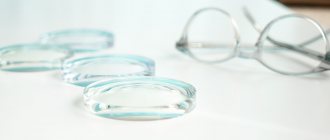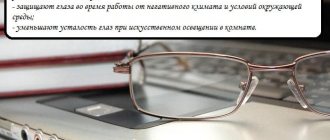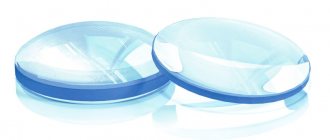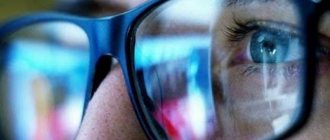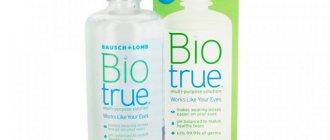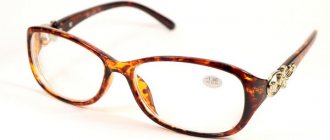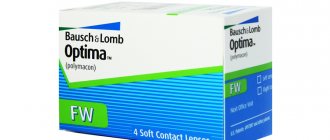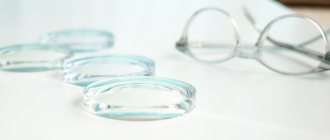Lenses have long been an alternative to glasses, which many people suffering from vision problems were forced to give up - glasses are completely incompatible with an active lifestyle, and not everyone wants to look like a “bespectacled person.” And, it seems, contact lenses are the ideal modern solution to the problem. Read: how to choose contact lenses correctly. But is this really so? What is really better - glasses or contacts?
Disadvantages of glasses
- The need to constantly carry them with you or on yourself.
- Side effects from choosing the wrong glasses, including fainting.
- Distortion of vision when wearing them.
- Limitation of lateral vision due to the temples.
- The risk of breaking or losing glasses at the moment when you need them most.
- Changes in appearance.
- Reflection of light.
- Fogging due to temperature changes.
- There is a problem with buying glasses if the difference in eye vision is greater than 2.0 D.
- High cost, subject to high-quality and beautiful frames.
How to choose glasses
The selection of glasses and contact lenses can only be carried out by an ophthalmologist. They must correct vision.
What is important when choosing glasses:
1. Choose the right lenses. They can be:
- Single vision. The optical power is the same over the entire surface.
- Multifocal. On the surface there are several zones with different dioptres, which transform into one another.
2. First of all, lenses must regulate visual acuity.
3. The doctor examines each eye separately.
4. The interpupillary distance must be measured correctly. This will help avoid additional strain on your eyes.
5
It is important to clarify for what purpose you need glasses:
- For working with a computer.
- Readings.
- Motor transport management.
6. The recipe must indicate the following parameters:
- Lens optical power.
- Interpupillary distance.
- Purpose of glasses.
Glasses are made individually according to your prescription.
The next step is choosing a frame. It can be made from the following materials:
- Plastics or polymers.
- Metal alloys or metal, including gold, silver.
- Combinations of metal and plastic.
A large number of frames allows you to choose the right option to suit your style.
You should be very responsible when choosing glasses, and they will last you a long time.
It should be noted that the doctor must write a different prescription for lenses. More on this later.
Benefits of contact lenses
- Natural vision correction is the movement of the lens following the movement of your pupil.
- No visual distortion - no reduction in view, change in size, etc.
- Comfortable to wear.
- Opportunity to engage in active sports.
- No dependence on weather conditions - rain is not a hindrance to lenses.
- Aesthetics. The opportunity not only to give up glasses that don’t suit you at all, but to “correct” your eye color thanks to colored lenses.
- Better compliance with medical requirements for visual impairments. That is, the possibility of wearing them with a difference in vision of more than 2.0 D, etc.
Which is better - glasses or contacts?
When making a choice, you must consider all the pros and cons.
Having considered the pros and cons of glasses and lenses, we can draw a conclusion. It is very important that both suit your indications. It is very convenient to have both glasses and contacts. For relaxation and work at the computer, choose glasses. Use lenses for driving and sports.
The question is often asked: is it possible to wear lenses and glasses at the same time? Yes, there are situations in which this is acceptable:
- To protect eyes from ultraviolet radiation. An excellent option for low vision. Use prescription lenses and non-prescription sunglasses together as UV protection.
- When working at a computer. Lenses correct vision, and glasses eliminate glare, increase contrast, and filter harmful radiation. This combination is very useful.
- When driving, chameleon glasses are used in conjunction with corrective lenses. They darken depending on the amount of light, which creates additional safety.
A comparison of glasses and lenses led us to the conclusion that vision correction is necessary, but how to do it correctly with lenses or glasses is up to you, and only an ophthalmologist can help with this
Disadvantages of contact lenses
- It is not recommended to take a shower (bath) in them. Lime deposits in running hard water are an ideal environment for microbes, so it is best to avoid getting tap water on the surface of the lenses.
- Risk of damage to the upper layer of the cornea, including loss of vision.
- The development of inflammatory processes and erosions, the risk of infection against their background - with constant wearing (for example, during working hours, throughout the week).
- Not recommended for children under 12 years of age.
- Risk of allergic reaction from lens solution.
- Reduced free access of air to the eyes.
- Not recommended when in an atmosphere saturated with chemicals and dust.
- More difficult to care for and use than glasses.
- High cost compared to glasses (laser vision correction is more practical).
Special attention to children!
It touches on the issues of visual impairment in children and I see how it worries Mikhail Mikhailovich. It turns out that they have been correcting the vision of this category of patients for a long time.
— Are there any specific features of contact vision correction in children?
— Among young people, myopia is 40-45%. Even comparisons with the countries of Southeast Asia, where their number reaches 80%, are no consolation. A mainly sedentary lifestyle, high visual load (oversaturated classes and stressful situations at school, computer, mobile phone) contribute to the development of this disease. This state of affairs is very worrying. Therefore, since 2007, we at the Center have been involved in vision correction in children and monitor the dynamics. We are pleased to note that in the majority of our patients, visual acuity does not decrease, but increases or remains at the same level. Night lenses, which I have already talked about, especially help here.
If vision deficiencies in a child are not identified in time and not corrected (at age 8, maximum 10 years), eye function may deteriorate in the future. Therefore, children should undergo complete vision correction in a timely manner. The further development of the child and his success in life depend on this.
Parents, unfortunately, often do not notice that their child’s vision has begun to deteriorate, and miss the moment when they can help her. Or they simply show criminal indifference, refusing optical vision correction and replacing it with “exercises” read in popular (I would even call it tabloid) literature. The result is wasted time, poor vision and all the ensuing difficulties. As for concerns that children will not be able to handle contact lenses, put them on correctly or care for them - come on! Our “advanced” children, even those of primary school age, learn to handle lenses faster and better than adults. And - note! - They do it with pleasure.
Careful care - and no problems! About 20 years ago, caring for soft contact lenses consisted of boiling them and placing them in a special container. Saline solution for lenses was made to order in one or two pharmacies.
— How about caring for contact lenses today?
— Any lens begins to become dirty from the first minutes of being in the eye. Proteins, fats, and inorganic compounds are deposited on the surface. If you do not take care of your lenses, therefore, daily residues gradually accumulate. The most unpleasant thing is that the proteins and tears envelop the lens and the eye strives to “associate” this foreign body with itself. Over time, proteins fragment and become denatured. This leads to eye irritation and poor wearing comfort. Modern solutions clean, disinfect the lens, moisturize it, that is, their action is aimed at making the lens comfortable to wear throughout the day.
— A new generation of solutions has appeared - with hyaluronic acid. What does this give?
— Hyaluronic acid in the body is found in tears and the vitreous body. It acts as a natural humectant, absorbing moisture and thereby increasing the comfort of the lens. Among the manufacturers of such solutions, Baush & Lomb (USA) stands out. The Biotrue solution, which produces not only hyaluronic acid, but also a pH level like tears, thereby maintaining the most favorable environment for the eye.
— How often should you change lenses?
- According to the recommended deadlines. After all, they have been verified by specialists and are aimed at ensuring safe use. It should be emphasized that both in the West and here there is a complete violation of the wearing regime. When we attend conferences, we communicate with colleagues and they always note that in the West, proper care of lenses and their timely replacement are neglected even more than here. The prices are about the same, so we can’t say that we care so much about lenses because they are too expensive. It’s just that the culture of using lenses is higher. You should properly care for your contact lenses: clean them, replace them on time, and then there will be no problems with them.
Are there any contraindications for contact lenses? Cases when the choice is only up to the glasses
The list of contraindications to wearing lenses includes almost all eye diseases that affect the conjunctiva and cornea.
- Inflammatory diseases of the cornea/conjunctiva/eyelids.
- Blepharitis.
- Inflammation of the cornea.
- Conjunctivitis.
- Ptosis.
- Low sensitivity of the cornea.
- Xerophthalmia.
- Glaucoma.
- Asthma.
- Lens subluxation.
- Inflammations, infections, allergic processes of the eyes.
- Dacryocyst.
- Strabismus at an angle greater than 15 degrees.
- Hay fever.
- Decreased/increased tear production.
- Certain types of professional activities.
- Chronical bronchitis.
- Tuberculosis and AIDS.
- Rhinitis.
It should be remembered that in case of any colds/viral diseases and inflammatory processes of the eyes, wearing lenses is strictly prohibited . During this period, it is better to use glasses.
Multifocal lenses. Advantages
-The biggest advantage of multifocal lenses is that they can provide correction for multiple vision problems at once. Thus, a person will only need to purchase one pair of glasses with several vision correction capabilities instead of a couple of different ones. - Multifocal contact lenses can significantly improve a person's appearance in such a way that he/she will no longer have to wear thick and ugly glasses. Another advantage is that they are great for those people who have undergone refractive surgery. - Additionally, people with cone-shaped corneas can also benefit from wearing this type of contact lenses. Activities such as sewing, reading, etc., which require concentration on nearby objects, will become quite accessible with their use.
What to choose in the end?
Despite the considered advantages and disadvantages of using one or another correction method, it is impossible to say unequivocally which is better - glasses or lenses. Everyone chooses a convenient option for themselves. Today, many experts advise having both options in your arsenal and alternating them: wearing, for example, contact lenses during the day and using glasses in the evening. This method, of course, is more expensive, but does not have such a detrimental effect on the eyes. Of course, even in this case it is quite difficult to advise anything - each patient makes his own decision. However, the best way out is to take care of the health of your eyes so that you don’t need correction at all.
